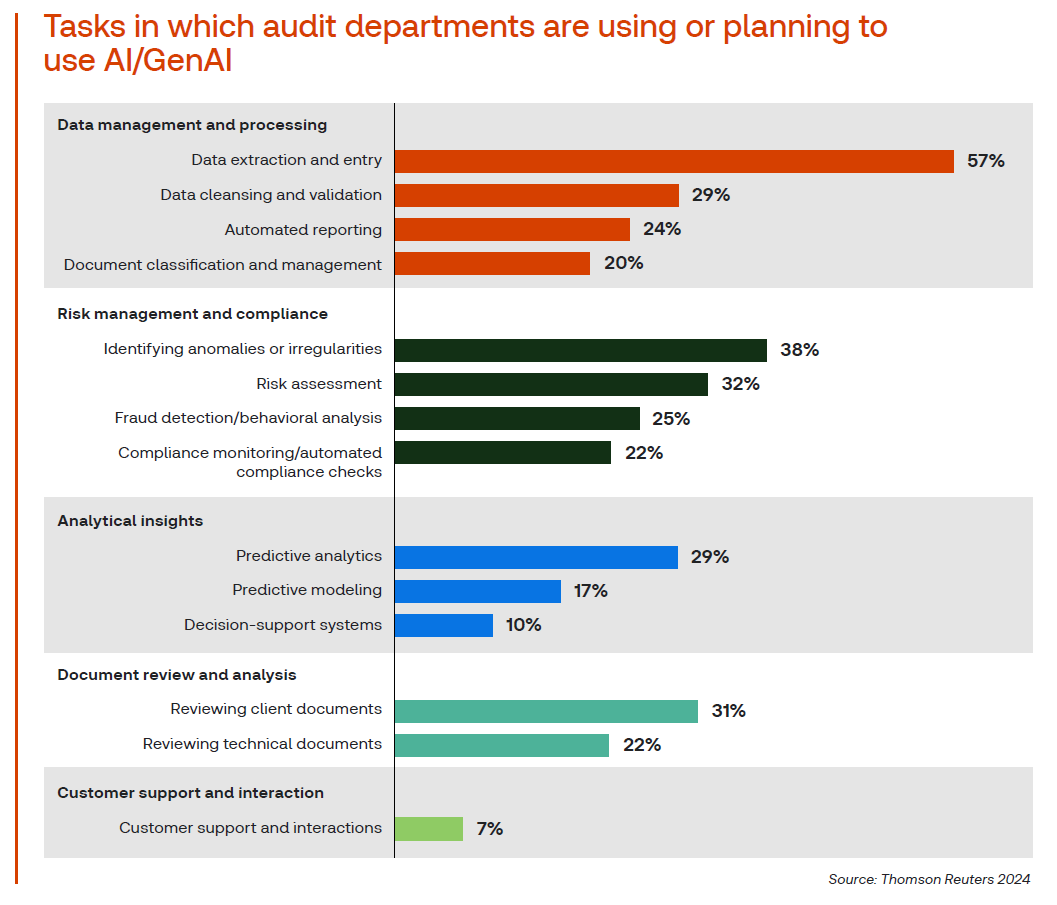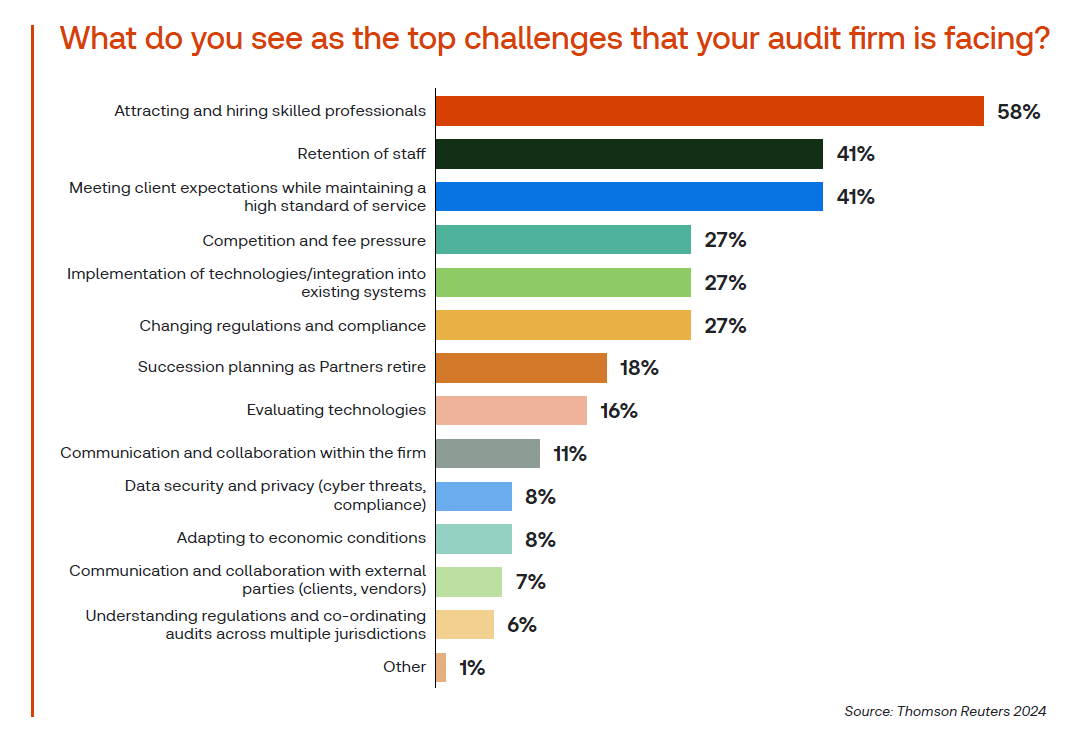More than half of audit firms say attracting and hiring skilled professionals is a top challenge, according to a recent report; but while staffing issues may preclude large-scale tech rollouts, there are some areas in which audit firms can find quick wins with new technologies
In recent years, the tax, accounting, and audit profession has experienced a staffing crunch. This should be no surprise to any firm or corporate business leaders who have tried to undertake hiring or engaged in succession planning, only to be left waiting for help that may not arrive.
Indeed, according to the recently released 2024 Audit Survey Report from the Thomson Reuters Institute, attracting and retaining skilled professionals is indeed a top priority among all audit professionals, with 58% calling it a top challenge that their firms face. Further, among respondents with multiple high priorities, attracting and retaining skilled professionals was ranked as the single highest priority for 43% of survey respondents in the United States and about one-third of those in the United Kingdom and Canada.
Yet, the situation has some audit professionals asking, can automation and other new technologies that are driven by artificial intelligence (AI) help close this people gap? While the report does find that many audit firms are in the early stages of exploring next-generation technologies, at the same time, these technologies require personnel to implement and execute. And many respondents said their firms can’t even get started on digital transformation initiatives because of a lack of qualified personnel who may be most capable of understanding and exploiting the benefits of these technologies.
The answer for many audit firms, of course, will lie in finding the balance. While large-scale technology implementations may elude some firms, there remain a number of use cases that could help perform audit work faster and at the same quality to better help firms close the staffing gap through automation.
What audit firms want
The current state of audit technology is not static. With a number of different solutions rapidly becoming available — some of them containing more advanced technologies such as generative AI (GenAI) — audit firms are looking to adopt new tech for a number of reasons that come down to one overarching theme: doing work faster, but at the same or better quality.
Indeed, according to the survey, technology adoption benefits cited by at least half of respondents include improving efficiency, freeing up an auditor’s time to address more complex issues, streamlining processes, and improving quality. “Audits of the size we perform are high in hours and low [in] recovery based on the high level required to meet compliance standards that provide little value to the audited client,” said one survey respondent. “It would be beneficial to have tools to increase the efficiency of audits.”
The issue is, however, that efficiency is needed for a number of different use cases. When respondents who said they use AI or GenAI and were asked how they were using the technology, they responded in a number of different ways. Some said their efforts were focused on back-end, internal data management and processing. Others said they were more client-focused, with risk management and customer support. Still others said they were looking to be more forward-thinking with the technology, using predictive analytics and modeling.

The result is that audit professionals believe next-generation, progressive technologies have a place in a number of different levels of the audit workflow. There’s a reason, after all, that 68% of respondents said their firms are adding new technologies at some stage of the audit process.
Supplementing the staff crunch
But that begs the question: Who will actually be implementing these technologies that audit firms are rushing to adopt? It’s an open question in many firms, and one that may hold back the ultimate efficacy of new technologies such as GenAI as they emerge.
Finding skilled professionals is a top challenge across the board in audit firms right now. In fact, more respondents cited attracting and hiring skilled professionals as a top challenge than any other barrier, including meeting client expectations or dealing with competition/fee pressure.

This hiring challenge also extends to the technology space. According to the report, more than half (54%) of all respondents said their audit firms are on the hunt for employees with critical thinking and problem-solving skills, with that percentage rising to 61% among US respondents. And nearly half of all respondents (49%) said their firms were looking to hire talent with technical audit and regulatory compliance knowledge (Canada 63%, the UK 58%, and the US 40%).
It may seem that audit teams want to use these new technologies, but they might not have the personnel to do a full rollout. So, how can they do more with less?
One easy way is rather than simply adopting AI for technology’s sake, take a use case-centric approach. Firm leaders and managers can look for the most time-consuming, repetitive tasks being done by their audit professionals — such as data entry, data cleansing, reviewing documents, and more — and determine for each task whether technology could provide a way to do the job quicker, at the same (or better) quality, in order to free up personnel for more client-centric tasks.
“Implementing dynamic audit technologies centers on leveraging data analytics and automation to create a more efficient, risk-focused, and insightful audit process,” said one respondent. “An example is AI that can eliminate repetitive tasks such as data extraction or control testing. This can save time for auditors to focus more on reviewing and communicating with clients.”
Another potential way to apply technology to the staffing problem is by fostering better communication and teamwork. A number of respondents said their firms were using technologies such as AI to not only automate and communicate throughout the client workflow, but for internal processes as well.
“We are looking to implement more dynamic technologies and spread them across our various teams so that work can be co-sourced within each team and cross-collaboration can occur,” noted one respondent. “Too often people are siloed, and developing technology that more people can work on will help this.”
The staffing challenge isn’t likely to get better in the coming years for audit firms. And while new technologies are not a replacement for the human touch, the research shows that many firms are already using tech to help supercharge their audit professionals within the firm, and in doing so help firms themselves do more with less.







